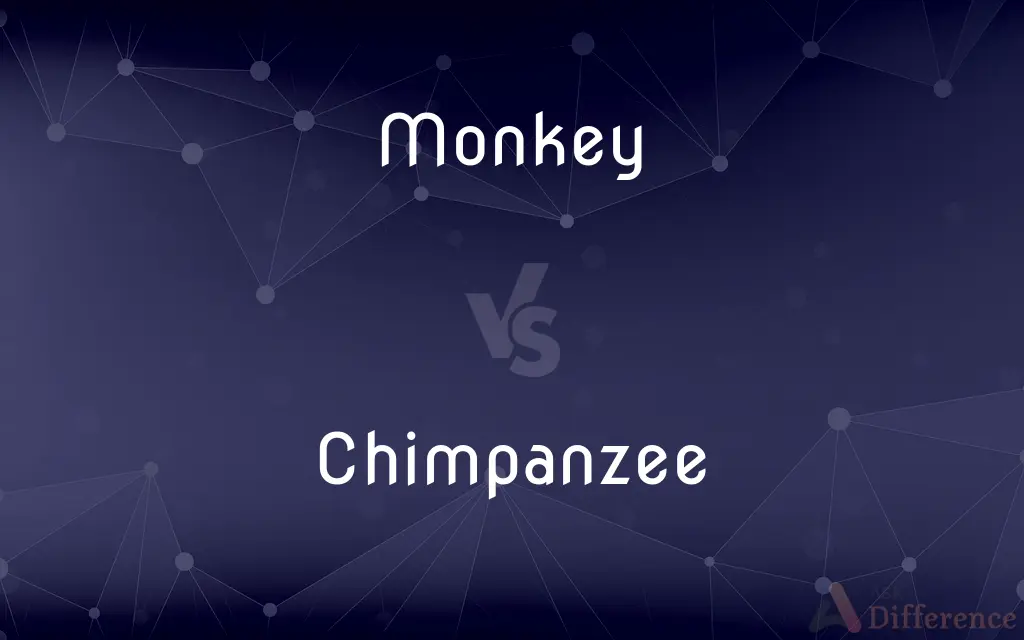Monkey vs. Chimpanzee — What's the Difference?
Edited by Tayyaba Rehman — By Fiza Rafique — Updated on September 20, 2023
A monkey is a general term for a variety of primate species, while a chimpanzee is a specific species of great ape.

Difference Between Monkey and Chimpanzee
Table of Contents
ADVERTISEMENT
Key Differences
Monkeys and chimpanzees are both primates, but they hail from different branches of the primate family tree. While the term monkey covers a broad range of species from various genera, the chimpanzee refers to a specific species. Monkeys are more diverse in terms of size, habitat, and behavior, while chimpanzees have a more defined set of characteristics.
One notable difference between monkeys and chimpanzees is their physical attributes. Monkeys usually have tails, which can be prehensile in some species, aiding in gripping branches. Chimpanzees, on the other hand, do not possess tails and have a more human-like structure, particularly in their hands and facial expressions.
Behaviorally, chimpanzees display a higher level of social complexity than most monkeys. They engage in intricate social structures, use tools, and exhibit behaviors indicating advanced cognitive abilities. While some monkey species also use tools and have complex social interactions, chimpanzees are often highlighted in studies due to their closeness to humans in the evolutionary tree.
Monkeys are widespread, found in various parts of the world including Asia, Africa, and Central and South America. They thrive in diverse habitats, from rainforests to savannahs. Chimpanzees are native to the forests of central and west Africa. Their habitat is more specific compared to the widespread distribution of monkeys.
In cultural contexts, monkeys are often associated with mischief and playfulness, featured in many folktales and myths across cultures. Chimpanzees, due to their close genetic relation to humans, often become subjects of study in anthropology and biology, providing insights into human evolution and behavior.
ADVERTISEMENT
Comparison Chart
Taxonomy
Broad term for various species across multiple genera.
Refers specifically to species in the Pan genus.
Physical Attributes
Typically have tails, varied sizes and appearances.
Lack tails, more human-like hands and facial expressions.
Habitat
Found in Asia, Africa, Central and South America. Diverse habitats.
Native to central and west African forests.
Behavior
Varies widely; some use tools, have complex social structures.
Advanced cognitive abilities, intricate social structures, tool use.
Relation to Humans
Distant relatives in the primate family.
Closer genetic relation to humans.
Compare with Definitions
Monkey
A mischievous person or thing.
Stop being such a monkey and sit still!
Chimpanzee
Displays intricate social structures.
The chimpanzee community had clear hierarchies and roles.
Monkey
A term used in various idiomatic expressions.
He has a monkey on his back, referring to an addiction.
Chimpanzee
A member of the Pan genus.
The bonobo is also a chimpanzee but of a different species.
Monkey
A device or implement resembling the action or appearance of a monkey.
He used a monkey wrench to fix the pipe.
Chimpanzee
Often a subject of anthropological and biological research.
She studied chimpanzee behavior for her doctoral thesis.
Monkey
Monkey is a common name that may refer to certain groups or species of simian mammals of infraorder Simiiformes. The term is applied descriptively to groups of primates, such as families of New World monkeys and Old World monkeys.
Chimpanzee
A great ape native to Africa, closely related to humans.
The chimpanzee used a stick to extract termites from a mound.
Monkey
Any of various tailed primates of the suborder Anthropoidea, including the macaques, baboons, capuchins, and marmosets, and excluding the apes.
Chimpanzee
Known for advanced cognitive abilities and tool use.
Researchers observed the chimpanzee making a tool from a twig.
Monkey
A nonhuman ape. Not in scientific use.
Chimpanzee
The chimpanzee (Pan troglodytes), also known as the common chimpanzee, or simply chimp, is a species of great ape native to the forest and savannah of tropical Africa. It has four confirmed subspecies and a fifth proposed subspecies.
Monkey
One who behaves in a way suggestive of a monkey, as a mischievous child or a mimic.
Chimpanzee
Either of two African apes of the genus Pan, having black hair, a bare face, somewhat arboreal habits, and a high degree of intelligence.
Monkey
The iron block of a pile driver.
Chimpanzee
The common chimpanzee (Pan troglodytes), of equatorial central and western Africa, having a stockier build than the bonobo (P. paniscus).
Monkey
(Slang) A person who is mocked, duped, or made to appear a fool
They made a monkey out of him.
Chimpanzee
Pan troglodytes, a species of great ape in the genus Pan, native to Africa, and believed by biologists to be the closest extant relative to humans along with the bonobo.
Monkey
Offensive Slang Used as a disparaging term for a person with dark skin.
Chimpanzee
(broadly) A member of the genus Pan, including the bonobo which is also known as the pygmy chimpanzee.
Monkey
To play, fiddle, trifle, or tamper with something
Who was monkeying with my phone?.
Chimpanzee
An african ape (Pan troglodytes, formerly Anthropithecus troglodytes, or Troglodytes niger) which approaches more nearly to man, in most respects, than any other ape. It is the most intelligent of non-human animals, and when full grown, it is from three to four feet high. A variant called the pygmy chimpanzee, or bonobo, has been recently recognized as a separate species.
Monkey
To behave in a mischievous or apish manner
Stop monkeying around!.
Chimpanzee
Intelligent somewhat arboreal ape of equatorial African forests
Monkey
To imitate or mimic; ape.
Monkey
(properly) A member of the clade Simiiformes other than those in the clade Hominoidea containing humans and apes, generally (but not universally) distinguished by small size, tails, and cheek pouches.
He had been visiting an area zoo when a monkey swung from its tree perch, swiped his glasses and hurled them into a hippo hole.
Monkey
Any simian primate other than hominids, any monkey or ape.
Chimpanzees are known to form bands to hunt and kill other monkeys.
Monkey
A human considered to resemble monkeys in some way, including:
Monkey
A naughty or mischievous person, especially a child.
Stop misbehaving, you cheeky little monkey!
Monkey
(slang) The person in the motorcycle sidecar in sidecar racing.
Monkey
(pejorative) idiot: a person of minimal intelligence.
Monkey
(pejorative) uggo: an unattractive person, especially one whose face supposedly resembles a monkey's.
Monkey
Synonym of puppet: a person dancing to another's tune, a person controlled or directed by another.
No, no, no, not you. I want to talk to the organ grinder, not the monkey.
Monkey
A menial employee who does a repetitive job supposedly requiring minimal intelligence.
Code monkey... grease monkey... phone monkey... powder monkey...
Monkey
A black, a black person.
Monkey
(historical) A small trading vessel of the sixteenth century.
Monkey
The vessel in which a mess receives its full allowance of grog.
Monkey
The weight of a pile driver or drop hammer.
Monkey
A fluid consisting of hydrochloric acid and zinc, used in the process of soldering.
Monkey
(slang) five hundred, especially (British) 500 pounds sterling or 500 dollars.
Monkey
(blackjack) face card.
Monkey
(slang) A person's temper, said to be "up" when they are angry.
Monkey
(slang) A drug habit; an addiction; a compulsion.
Everybody's got something to hide except for me and my monkey.
Monkey
(dance) A dance popularized by Major Lance in 1963, now usually only its upper-body dance move involving exaggerated drumming motions.
Monkey
To meddle; to mess (with).
Please don't monkey with the controls if you don't know what you're doing.
Monkey
(transitive) To mimic; to ape.
Monkey
In the most general sense, any one of the Quadrumana, including apes, baboons, and lemurs.
Monkey
A term of disapproval, ridicule, or contempt, as for a mischievous child.
This is the monkey's own giving out; she is persuaded I will marry her.
Monkey
The weight or hammer of a pile driver, that is, a very heavy mass of iron, which, being raised on high, falls on the head of the pile, and drives it into the earth; the falling weight of a drop hammer used in forging.
Monkey
A small trading vessel of the sixteenth century.
Monkey
To act or treat as a monkey does; to ape; to act in a grotesque or meddlesome manner.
Monkey
Any of various long-tailed primates (excluding the prosimians)
Monkey
One who is playfully mischievous
Monkey
Play around with or alter or falsify, usually secretively or dishonestly;
Someone tampered with the documents on my desk
The reporter fiddle with the facts
Monkey
Do random, unplanned work or activities or spend time idly;
The old lady is usually mucking about in her little house
Monkey
A small to medium-sized primate, typically with a tail.
The monkey swung from branch to branch with ease.
Monkey
A sum of 500 pounds sterling.
He owes me a monkey from last week's game.
Common Curiosities
Can monkeys use tools like chimpanzees?
Some monkey species use tools, but chimpanzees are particularly known for their advanced tool use.
Why are chimpanzees often studied by scientists?
Chimpanzees are closely related to humans, providing insights into human evolution and behavior.
Where can you find monkeys in the wild?
Monkeys are found in Asia, Africa, and Central and South America in various habitats.
Do all monkeys have tails?
Most monkeys have tails, but not all. It varies by species.
Do monkeys and chimpanzees communicate similarly?
Both have their ways of communicating, but chimpanzees often exhibit more complex communication patterns.
Which is larger, a monkey or a chimpanzee?
It varies by monkey species, but generally, chimpanzees are larger than most monkeys.
Are chimpanzees the only apes in Africa?
No, Africa is home to other apes like gorillas and bonobos too.
Are all chimpanzees monkeys?
No, while all chimpanzees are primates, they are not classified as monkeys.
Are chimpanzees endangered?
Yes, chimpanzees are classified as endangered due to habitat loss and hunting.
Are chimpanzees aggressive?
Chimpanzees can be aggressive, especially when defending territory or resources.
Can both monkeys and chimpanzees be taught sign language?
Both have shown the ability to learn sign language, but chimpanzees have been more extensively studied in this aspect.
Is it true that monkeys are often kept as pets?
Yes, some people keep monkeys as pets, though it's often discouraged due to ethical and safety reasons.
Is it correct to say "monkey around" when referring to a chimpanzee's behavior?
While "monkey around" is an idiom referring to playful or mischievous behavior, it's not specifically tied to chimpanzee behavior.
What do monkeys eat?
Monkeys are omnivorous and eat fruits, leaves, insects, and sometimes small animals.
What's the difference between a monkey's and a chimpanzee's social structure?
While both have social structures, chimpanzees have more intricate hierarchies and roles in their communities.
Share Your Discovery

Previous Comparison
Carp vs. Crap
Next Comparison
Pharmacology vs. PharmaceuticsAuthor Spotlight
Written by
Fiza RafiqueFiza Rafique is a skilled content writer at AskDifference.com, where she meticulously refines and enhances written pieces. Drawing from her vast editorial expertise, Fiza ensures clarity, accuracy, and precision in every article. Passionate about language, she continually seeks to elevate the quality of content for readers worldwide.
Edited by
Tayyaba RehmanTayyaba Rehman is a distinguished writer, currently serving as a primary contributor to askdifference.com. As a researcher in semantics and etymology, Tayyaba's passion for the complexity of languages and their distinctions has found a perfect home on the platform. Tayyaba delves into the intricacies of language, distinguishing between commonly confused words and phrases, thereby providing clarity for readers worldwide.















































